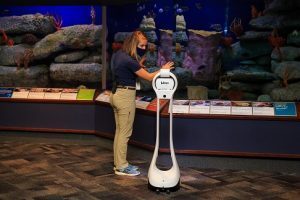News
Google Awards the South Carolina Aquarium an “Aquabot”
Press Release
 For more than twenty years, the South Carolina Aquarium has connected people to water, wildlife and wild places through diverse programming, inspiring exhibits and concerted conservation initiatives. Furthering that goal of connection, the Aquarium has proudly served as the state’s foremost STEM education institution offering a variety of state standards-aligned, experiential learning opportunities to K-12 students across the state.
For more than twenty years, the South Carolina Aquarium has connected people to water, wildlife and wild places through diverse programming, inspiring exhibits and concerted conservation initiatives. Furthering that goal of connection, the Aquarium has proudly served as the state’s foremost STEM education institution offering a variety of state standards-aligned, experiential learning opportunities to K-12 students across the state.
As technology advances and virtual learning becomes increasingly accessible, the Aquarium and Google are leading the charge connecting our scientists of tomorrow with science today. As part of Google’s Data Center Community Grants Program, the Aquarium was awarded funds to support the launch of a state-of-the-art telepresence robot, temporarily dubbed the “Aquabot.” This innovative addition to the Aquarium’s distance learning offerings is in the early stages of testing, and will allow students to participate in field trip experiences and engage in on-site programming from the convenience of their classrooms or elsewhere.
“Google is thrilled to help bring the Aquarium experience into South Carolina students’ classrooms,” said Lilyn Hester, head of Southeast public affairs, Google. “This innovative technology makes student accessibility a priority. Students thrive during hands-on learning opportunities, and we hope the Aquabot will inspire students to pursue STEM education and careers.”
Fittingly, the Aquarium partnered with St. Stephen Elementary School in Berkeley County, where Google has a data center, for the Aquabot’s inaugural lessons. Working in concert with Berkeley County School District officials, the pilot program at St. Stephen took place in December and reached more than 120 students ranging from PreK through fifth grade. The students were able to “visit” the Aquarium through an engaging and uniquely customizable learning experience as they navigated the Aquabot through the galleries with an Aquarium educator in tow.
“Our students have experienced a lot of changes this year due to the COVID-19 pandemic, including restrictions on field trips,” said Jennifer Tran, technology coach at St. Stephen Elementary. “This experience was invaluable as it was the first time many of our students have seen the Aquarium. Judging by the looks on their faces, they had the same reaction sitting at St. Stephen as they would have had in person. This was more than a virtual field trip — it was an experience. It was an experience I will never forget, and I am sure our students will not forget either.”
The Aquabot is a welcome addition to the Aquarium’s catalogue of informal educational offerings, many of which are focused on maximizing accessibility to Title 1 and low-income schools. Its versatility and ability to provide a first-person experience from afar will allow students to simulate an Aquarium visit at their discretion while enjoying a natural learning environment.
The Aquarium’s distance learning interpreter, Susan McLaughlin, recognizes the benefit of having this new, innovative learning tool. “The Aquabot is such a fantastic resource because it puts the control in the hands of the student. They can explore at their own pace and choose their own adventure, creating connection with not only the animals and exhibits but also the Aquarium guests sharing in their wonder. The Aquabot gives students the unique opportunity to go from passive viewers to engaged participants,” says McLaughlin.
This unique learning opportunity was nearly derailed by wi-fi deficiencies throughout the Aquarium. Fortunately for the Aquarium and students across South Carolina, Google stepped up again to identify and provide the upgrades needed through their Charleston Free Wi-Fi Initiative. As a result, the Aquarium’s distance learning programs as a whole have benefited, allowing staff to virtually connect with students across the world and share with them a wider array of creatures, like the often-requested jellies and octopus!
The pilot program benefited the St. Stephen students and Aquarium educators alike, as the Aquarium’s education team explored how to best utilize their newest robot teammate. While the team continues testing the Aquabot, they are excited about the potential to offer the experience to a wider audience in the future, including homeschooling families, the immunocompromised and even young hospital patients yearning for the Aquarium experience.
























